College of Arts and Sciences Student Awards
The College of Arts and Sciences at Saint Louis University recognizes the scholastic and creative achievements of our outstanding students.
CAS Graduate Award Guidelines
Each year, the College of Arts and Sciences recognizes a distinguished thesis written by a master’s student and a distinguished dissertation written by a doctoral student.
The Distinguished Thesis Award honors exceptional scholarship, research and writing by thesis master’s students in the College of Arts and Sciences.
The winner of the CAS Distinguished Thesis Award will receive an honorarium of $700. Up to two honorable mentions will be awarded, with honoraria of $150.
Criteria and Eligibility
All thesis master’s students may apply for initial consideration by the committee. (Only one student from each thesis master’s degree-granting unit in the College of Arts and Sciences may be a finalist.) Students whose degrees were conferred in 2024 are eligible for the 2025 award.
Application Process
Submit applications by completing and sending the application form. Applications must be submitted by 5 p.m. on Jan. 31, 2025.
- An application includes:
- Name
- SLU ID
- Degree-granting department or program
- Date of degree conferral
- Current email address
- Current mailing address
- Title of thesis
- A thesis summary of no more than 10 double-spaced pages (12-point, Times New Roman font or similar). Must be included as a PDF in the form.
- A chapter-length writing sample from the thesis. Must be included as a PDF in the form.
- The applicant's CV (no more than two pages) Must be included as a PDF in the form.
- A thesis summary of no more than 10 double-spaced pages (12-point, Times New Roman font or similar). The summary must be written by the nominee for an audience of non-specialists.
- A chapter-length writing sample from the thesis.
- The nominee’s CV (no more than two pages).
Selection Process
A multidisciplinary committee will meet twice. First, the committee will examine the applications in order to create a list of finalists, with no more than one finalist being chosen from any master’s degree-granting program.
The committee will then ask each finalist's department/advisor to provide a letter that supports the selection of the thesis and explains how it constitutes a significant contribution to the discipline. The committee will then examine the entire application and select winners based on the significance of their contribution to their disciplines.
The committee will consider both content and method, assessing the importance of the study, originality of the work, the caliber of the scholarship, publication potential, and the quality of the writing, among other measures of excellence.
The Distinguished Dissertation Award honors exceptional scholarship, research and writing by doctoral students in the College of Arts and Sciences.
The winner of the CAS Distinguished Dissertation Award will receive an honorarium of $700. Up to two honorable mentions will be awarded, with honoraria of $150.
Criteria and Eligibility
All CAS doctoral students whose degrees were conferred in 2025 are eligible to apply for initial consideration by the committee for the 2026 award. (Only one student from each doctoral program in the College of Arts and Sciences may be a finalist.)
Application Process
Submit applications by completing and sending the application form. Applications must be submitted by 5 p.m. on Jan. 31, 2026.
- An application includes:
- Name
- SLU ID
- Degree-granting department or program
- Date of degree conferral
- Current email address
- Current mailing address
- Title of dissertation
- A dissertation summary of no more than 10 double-spaced pages (12-point, Times New Roman font or similar). The summary must be written by the applicant for an audience of non-specialists. Must be included as a PDF in the form.
- A chapter-length writing sample from the dissertation. Must be included as a PDF in the form.
- The applicant’s CV (no more than two pages). Must be included as a PDF in the form.
Selection Process
A multidisciplinary committee will meet twice. First, the committee will examine the applications in order to create a list of finalists, with no more than one finalist chosen from any doctoral degree-granting program. The departments/advisors of the finalists will then be asked to provide a letter that supports the selection of the dissertation and explains how it constitutes a significant contribution to the discipline. The committee will then examine the entire application and select award winners based on the significance of their contribution to their disciplines. The committee will consider both content and method, assessing the importance of the study, originality of the work, the caliber of the scholarship, publication potential, and the quality of the writing, among other measures of excellence.
Diversity, Equity, and Inclusion Undergraduate Champion Award
The College of Arts and Sciences Undergraduate DEI Champion Award recognizes a graduating senior in the college who has made significant contributions to advancing Diversity, Equity and Inclusion in areas including but not limited to race and ethnicity, gender and gender identity, sexual orientation, socioeconomic status, language, culture, national origins, religious commitments, age, disability status, political perspectives within the university and/or in the broader community. Categories include, but are not limited to, advocacy, activism, community engagement, and/or research.
The CAS DEI Committee must receive nominations by Jan. 29. A candidate must have 90 or more undergraduate hours by that time. Winners receive an honorarium.
James D. Collins/Outstanding Senior Awards
Each April, the College of Arts and Sciences recognizes outstanding seniors. Faculty members nominate students in their disciplines. Each department chooses one student, a graduating major in their program, to receive the award annually using its own criteria and procedures.
The office of the dean must receive nominations by February 21. A candidate must have 90 or more undergraduate hours by that time. Winners receive an engraved college medallion.
Pre-Commencement Awards
The College of Arts and Sciences recognizes graduating students who are members of honorary societies and who receive special departmental awards at our pre-commencement ceremony each May. We are proud of our graduates’ participation in a wide variety of activities and recognize their success not only in the classroom but on campus, in the community and in the world.
2025 College of Arts and Sciences Student Awards
2025 Transformative Engagement Awards
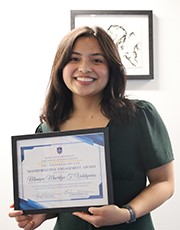
Undergraduate Transformative Engagement Award: Monique Maerilyn Valdepenas, Spanish/speech, language, and hearing sciences
Monique, a senior majoring in Spanish and speech, language and hearing sciences, will graduate this spring. With support from the CAS Knoedler Fund and mentorship from Christina García, she traveled to Cuenca, Ecuador, in October 2023 to collect sociolinguistic interviews. During her time at Saint Louis University, she has been involved in linguistic research and served in a leadership role in the Spanish Club. After graduation, she plans to attend Rush University in Chicago to become a speech-language pathologist and hopes to serve multicultural families.
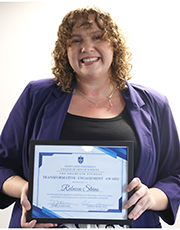
Graduate Transformative Engagement Award: Rebecca Steins, clinical psychology
Rebecca is a fourth-year doctoral candidate in Saint Louis University’s clinical psychology program, specializing in clinical sport psychology. She also completed a graduate minor in women and gender studies. As assistant director of SLU’s sport psychology team, she incorporates principles of diversity, equity and inclusion in her clinical work, aiming to reduce systemic barriers to care for student-athletes through an intersectional feminist approach.
Her research focuses on how gender norms affect athletic injury, and her dissertation explores the development and impact of a feminist narrative therapy for injured women athletes. Outside of academia, she mentors women in sport psychology, raises awareness about identity, sport and mental health, and provides cultural humility training for sport professionals.
Steins works to create inclusive spaces and empower athletes, advocating for systemic change in sport and beyond. She has received several awards for academic excellence, including two Student Research Awards from the Association for Applied Sport Psychology, multiple departmental and Graduate Student Association travel and publication awards, and the Robert Wheeler Endowed Assistantship for her dissertation.
She will begin her doctoral residency in sport psychology at James Madison University’s Counseling Center in the fall and is expected to graduate from SLU in May 2026.
2025 Undergraduate Collins Award Winners
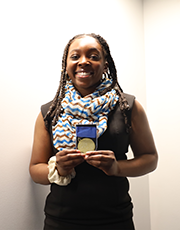
African American Studies: Wosilat (Grace) Fatuga
During her time at Saint Louis University, Wosilat has grown as a scholar, student and leader committed to serving her community. She has been an MLK Scholar and a member of the Micah Program for all four years, completing more than 200 hours of service to support the academic development of young students in the St. Louis community.
In her senior year, she served as an intern for the 25th annual Atlas Week Program celebration. She has also been a member of SLU’s Xquizit Hip Hop Dance Team for four years, serving as public relations chair for two years and as co-captain in her final year. The team has performed at SLU men’s basketball games and has been invited to a street dance showcase in Chicago for three consecutive years. In addition to performing, she choreographed nine original pieces showcased in both St. Louis and Chicago.
She is concluding her time at SLU as a recipient of the James D. Collins Award for Academic Excellence through the College of Arts and Sciences and the Department of African American Studies, as well as the Dr. William “Bill” Monahan Social Action and Service Award from the Department of Sociology and Anthropology.
After graduation, she plans to pursue a law degree with the goal of becoming an attorney who advocates for and works with children and families. She will also continue her work as a teaching artist with the Joffrey Ballet in Chicago.
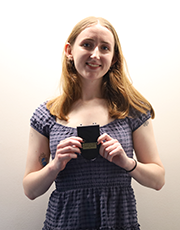
American Studies: Aileen O'Connor
Aileen is graduating with majors in American studies and English. At Saint Louis University, she has served as a section editor and writer for OneWorld Magazine, a peer mentor in the Study Abroad Office, and a member of Sigma Tau Delta, the international English honor society.
She plans to pursue a career in arts administration, building on her experience as a student worker at the Museum of Contemporary Religious Art and internships with the St. Louis Poetry Center and Bread and Roses Missouri. She also intends to continue her education by pursuing a master’s degree in the humanities in the near future.
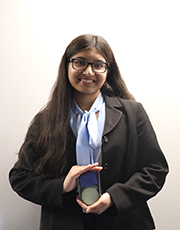
Biology: Sugandha Bollu
Sugandha, a senior majoring in biology and sociology with a minor in public health, is originally from Edison, New Jersey. At Saint Louis University, she volunteers with WHISTLe, serves as an Oriflamme Leader, and is a member of the University Honors and Medical Scholars programs.
She has also volunteered as a childcare worker at Almost Home, served as an associate editor for the National Collegiate Honors Council Journal of Undergraduate Research and Creative Activity, and is a certified EMT. In the Biology Department, she has worked as a teaching assistant for General Biology and conducted cancer research.
She is a member of Phi Beta Kappa, Alpha Sigma Nu, Sigma Xi, and Alpha Kappa Delta honor societies. She has earned the Outstanding Poster Presentation Award at the American College of Gastroenterology Conference and the Volunteer Spotlight Award at Almost Home.
In her free time, she enjoys drawing, painting and running. After graduation, she will attend the Saint Louis University School of Medicine to become a physician and work to address health inequities while providing quality medical care.
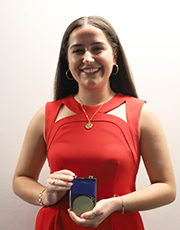
Catholic Studies: Carina Swonger
Carina is graduating with degrees in Catholic studies and theological studies, along with minors in philosophy and education. She currently serves as the communications intern for the Catholic Studies Center and holds several volunteer roles, including social chair of the Sodality, Bible study leader, liturgical musician and podcast co-host.
In addition to her work at the Catholic Studies Center, she has participated in a variety of campus organizations, including the University Honors Program, Concert Band, University Undergraduate Core Committee, Students for Life, Campus Ministry and Micah: Living the Mission. She is also a member of Alpha Sigma Nu, the honor society of Jesuit colleges and universities.
This fall, she will pursue a Master of Arts in theology at the Aquinas Institute of Theology in St. Louis. She is honored to receive the Outstanding Student Award for Catholic Studies and is grateful for the intellectual, spiritual and communal formation she has received through the program.
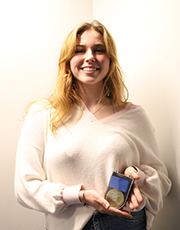
Communication: Lauren Hutchens
During her time at Saint Louis University, Lauren has navigated the challenge of discovering her interests and strengths for a future career. Initially drawn to social advocacy and writing, she began college as a neuroscience major. Today, she is the editor-in-chief of the university’s newspaper, The University News.
Before taking on the top role, she served as co-news editor and earned recognition at the MCMA Awards, winning first and second place for best college investigative journalist and piece. This year, she placed second in news writing, second in-depth news reporting, and third for front page design — all while balancing the demands of her leadership role.
Looking ahead, she plans to pursue a career as an investigative or news reporter.
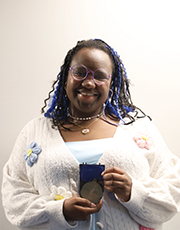
English: Hope Abrams
Hope is involved in the Micah Learning Community, where she holds several leadership positions. She is a member of the English honor society, Sigma Tau Delta, and works as a lifeguard instructor and resident assistant on campus. Hope will return to Saint Louis University in the fall to pursue a master’s degree in English.
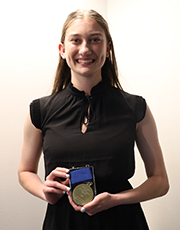
Forensic Science: Rosslyn Garbarini
Rosslyn is graduating with a major in forensic science and a minor in biology. She completed research for Gentueri Inc. and interned at the St. Louis Metropolitan Police Department Crime Laboratory in the DNA and biology section. She is also a captain and four-year member of the Saint Louis University Dance Team.
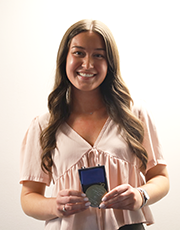
Health Care Ethics: Sophie Crane
Sophie is a bioethics and health studies major with a minor in public health. She has been involved in the SLU Honors Program and Pre-Law Scholars, serving as treasurer of Phi Alpha Delta and vice president of membership for Delta Gamma. Sophie will begin law school in the fall to pursue health law.
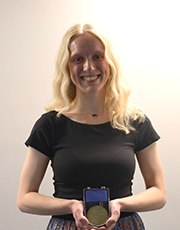
History: Chloe Olliff
Chloe is graduating with majors in history, English, German and medieval studies. Throughout her undergraduate career, she had the opportunity to study abroad in Madrid, Heidelberg and Oxford, which deepened her interest in medieval and early modern history and literature.
Her research interests expanded while writing her history senior thesis, which explores the poetic and public image of the Oxford Physick Garden during the political turmoil of 17th-century England. She enjoys studying how literature can shed light on the thoughts and experiences of people from centuries past.
At Saint Louis University, she has served as a research assistant at the Vatican Film Library, a teaching assistant for the Honors Program, and currently serves as president of SLU’s chapter of Phi Alpha Theta, the National History Honor Society. These roles have helped her develop skills in research, leadership and sharing her passion for history with others.
She is grateful for the continuous support from the history faculty throughout her degree. After graduation, she will pursue a master’s in English literature at the University of Oxford, where she will continue exploring the intersection of history and literature. Following her time at Oxford, she plans to become a high school teacher, inspiring students to explore, question and empathize with the past.
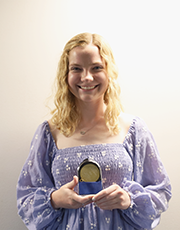
Languages, Literatures, and Cultures: Bridget T. Guerin
While attending Saint Louis University, Bridget pursued a double major in French and international studies. In addition, she participated in the Honors Program and was a member of both the International Studies and French honor societies.
During the final year of undergraduate studies, she served as a student ambassador for the French program and treasurer of the French Club’s executive board. She was recently honored with the Grueber Award from the International Studies Department.
Throughout time at SLU, she interned with globally focused organizations, including World Relief in Illinois and the World Affairs Council in St. Louis. These roles offered opportunities to engage with professionals around the world and deepen an understanding of global issues. While shadowing the children and youth specialist at World Relief, she developed a strong commitment to supporting the well-being of refugee populations, particularly children.
In her junior year, she spent an academic year studying abroad in Lyon, France. The experience not only strengthened her French language skills but also broadened awareness of different cultures and global perspectives.
On campus, she sang in the St. Francis Xavier Mass Choir and tutored students at the Loyola Academy of St. Louis. Following graduation, she hopes to pursue a role that aligns with a passion for immigrant advocacy, proficiency in French, and a commitment to working with children.
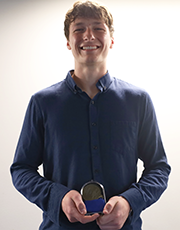
Mathematics and Statistics: Kieran Favazza
Kieran launched and continues to edit SLU's math magazine ForALL with Ozlem Ugurlu, Ph.D., and has taken part in numerous research projects with her and Elodie Pozzi, Ph.D. He has been a tutor in the mathematics help sessions, a teaching assistant, and he has served as the president of the SLU Math and Computer Science Club for the past two years. He has competed in the Missouri Collegiate Mathematics competition for SLU for the past three years, with his team coached by Brody Johnson achieving second place in 2024. He has completed graduate coursework and plans to continue doing so in pure or applied mathematics after graduation.
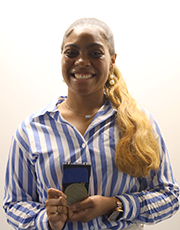
Neuroscience: Kelci Crandall
Kelci Crandall graduated from Saint Louis University in December with a major in Neuroscience and a minor in Healthcare Ethics. Throughout her undergraduate career, Kelci demonstrated a strong commitment to academic excellence, mentorship, and community engagement. During her time at SLU, she founded the Black Medical Society to support and uplift underrepresented pre-medical students through mentorship, hands-on medical workshops, and professional development. She is also a recipient of both the Spirit of the Billiken Award and the Hidden Figures Social Change Award, recognizing her leadership and commitment to community engagement. Kelci served the SLU community in multiple leadership and mentorship roles—as a Pre-Health Advisor, SLU 101 Leader, Organic Chemistry Tutor, and Biology Learning Assistant—where she supported and guided students academically and personally. She also serves as a research assistant in Tony Buchanan, Ph.D.,’s Cognitive Neuroscience of Stress Lab. Currently, she is working as a MOHS Surgery Dermatology Medical Assistant while applying to medical school.
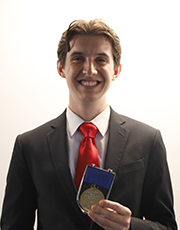
Philosophy – Christian Rickert
Christian Rickert is double majoring in philosophy and Catholic Studies and has minors in English and Spanish. During his first two years, Christian was a member of the MICAH learning community, eventually becoming a peer mentor for the program. He also worked as a student worker for the Pius Library Rare Books Room and studied abroad in Madrid, Spain. Additionally, Christian has been published in the SLU undergraduate journal, "the KILN." In these past couple of years, Christian has worked as the Academic Intern for Catholic Studies, directed its scriptural fellowship program, and fundraised with the nonprofit "The Labouré Society." After graduation, Christian will be entering Catholic religious life and formation to the priesthood with the Dominican Friars of the Province of St. Albert the Great.
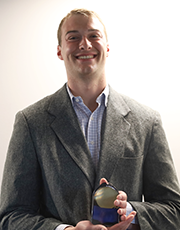
Political Science: Benjamin Choquette Kemper
Ben Kemper is a senior from Cincinnati. He loves baseball, singing, and National Parks. As a SLU political science student, some of Ben’s favorite memories have been participating in Moot Courts, studying voting behavior, and researching the Missouri Education Funding Formula. Ben is doing a year of Service with the Jesuit Volunteer Corps in Philadelphia following graduation. He will be working at the Welcoming Center, a nonprofit that assists migrants in finding and maintaining employment.
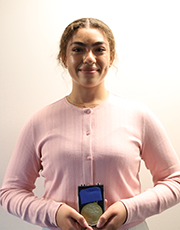
Psychology: Maryah Burrell
Maryah has been an MLK Scholar throughout all three years at Saint Louis University. During the spring of her junior year, her capstone group received the Capstone Excellence Award. She also earned the Access Path to Psychology and Law Experience Program Award from the American Psychology-Law Society.
In addition to academic honors, she serves as president of the Inside Out Alliance, a campus organization that promotes awareness of mass incarceration and collaborates with the SLU Prison Education Program.
Following graduation, she will attend William James College in the fall to pursue a Doctor of Psychology (PsyD) in clinical psychology.
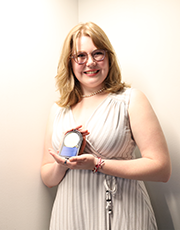
Sociology and Anthropology: Charlotte Gregg
Throughout her time at Saint Louis University, she has remained committed to academic excellence while actively engaging in opportunities beyond the classroom. She has been deeply involved in the Anthropology Club and Model United Nations, holding leadership roles in both organizations.
Since fall 2023, she has been a member of Lambda Alpha, the national anthropology honor society. In her junior year, she received the Baer Scholarship, which included an internship at the Saint Louis University Museum of Art and the completion of a related project.
She has also worked as a research assistant, contributing to a project that led to coauthorship of a research article accepted for publication in a peer-reviewed journal.
Following graduation, she will begin a Master of Arts program in social anthropology at York University in Toronto, Canada.
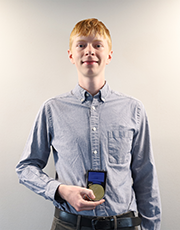
Theological Studies: Sean Patterson
Sean is majoring in Catholic studies, English, philosophy and theology. He is teaching at a classical academy in Seattle next year.
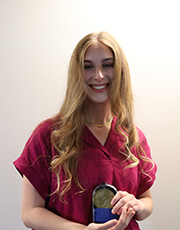
Visual and Performing Arts: Madeline Shormas
Madeline is a senior majoring in art history. She has made the Dean's List more than once. She studied abroad in Morocco in Spring of 2024, completing an organizational internship in the process. While in Morocco, she pursued challenging academic material, including but not limited to immersing herself in two Arabic language courses. Madeline recently presented her capstone thesis at two art history symposiums, the Undergraduate Art History Symposium at Saint Louis University and the SUNY New Paltz Undergraduate Art History Symposium. Due to her academic excellence and commitment to her community, Madeline was accepted into two honor societies, Alpha Sigma Nu and Phi Beta Kappa. Madeline is also a peer mentor for SLU's study abroad program. In addition to her accomplishments at SLU, she also completed a fellowship at the Pulitzer Arts Foundation in St. Louis, which allowed her to serve her community and further pursue her love of the arts. Madeline's post-graduate plans involve attending graduate school to earn a PhD in Art History.
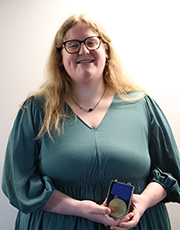
Women’s and Gender Studies: Emma Lercher
Emma is studying Women's and Gender Studies and Political Science. Throughout her time at SLU, she has been involved in the Student Government Association, Model United Nations, and Mock Trial. Additionally, Emma has worked in Housing and Resident Life and the Student Involvement Center. In the community, Emma has served as a tutor at Rosati Kain Academy and a volunteer at The Women's Safe House. After graduation, Emma plans to work in higher education before eventually pursuing law school. In her career, Emma hopes to work toward accessible and equitable education for everyone.
2025 Graduate Awards
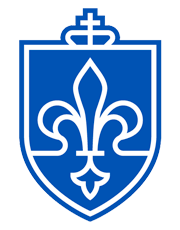
Distinguished Dissertation Award (Honorable Mention)
Amelia Flood, American studies

Distinguished Dissertation Award (Winner)
Lou Vinarcsik, Ph.D., health care ethics
Lou Vinarcsik (she/they) is a 6th year MD/PhD student at Saint Louis University. She received her PhD in Healthcare Ethics in the spring of 2024 and has since returned to medical school to complete her MD, with an anticipated graduation from the School of Medicine in the spring of 2026. Lou's research explores the history of medicine in the United States during the 20th century, with a focus on the conceptual and political formations which informed (and continue to shape) the development of free clinics. She plans to pursue a residency in Family Medicine, with the goal of providing accessible, high-quality primary and preventative care to underserved communities. Her dissertation research gave her insights into how radically different medical institutions could have been, and may just be yet.

Distinguished Thesis Award (Honorable Mention)
Kellen Blum, psychology
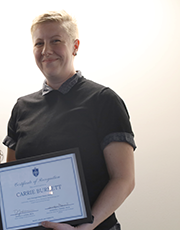
Distinguished Thesis Award (Winner)
Carrie Burnett, psychology
During her time at Saint Louis University, she demonstrated a strong commitment to academic excellence and active campus involvement. She held leadership roles in both the Anthropology Club and Model United Nations and became a member of the Lambda Alpha National Anthropology Honor Society in fall 2023.
In her junior year, she was awarded the Baer Scholarship, which included an internship at the Saint Louis University Museum of Art and the completion of a related project. She also worked as a research assistant, contributing to a study that resulted in coauthorship of a research article accepted for publication in a peer-reviewed journal.
After graduation, she will continue her academic career in a Master of Arts program in social anthropology at York University in Toronto, Canada.